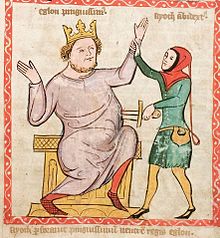Eglon (king)
| Eglon | |
|---|---|
 Depiction of the assassination of King Eglon by Israelite Judge Ehud, Speculum Humanae Salvationis, 1360. | |
| In-universe information | |
| Title | King of Moab |
| Affiliation | Ammon and Amalek |
| Birth place | Kingdom of Moab |
| Death place | Kingdom of Moab |
According to the Book of Judges, Eglon (Hebrew: עֶגְלוֹן ‘Eglon) was king of Moab who oppressed Israel.
He was the head of the confederacy of Moab, Ammon and Amalek in their assault on Israel.[1] Eglon reigned over the Israelites for 18 years.[2] One day, Ehud, who was left handed, came presenting a customary tribute and tricked Eglon and stabbed him with his sword, but when Ehud attempted to draw the sword back out, the obese king's excess fat prevented its retrieval. His servants, believing he was relieving himself, left him be. In the aftermath of his death, the Moabites were routed and the Israelites enjoyed eighty years of peace.[3]
Rabbis in the Talmudic tradition claimed that Ruth was Eglon's daughter. According to this tradition, Eglon was rewarded for rising out of respect when Ehud mentioned the Israelite God by having King David as a descendant. This can also be seen as an attempt to provide a royal lineage to David. The Talmud also describes Eglon as the grandson of Balak.[4] There is, however, no basis in the actual verses for such an assertion.
His descendants[]
According to a legend in a midrash, the two Moabite women from the Book of Ruth Orpah and Ruth, were sisters, and both were daughters of the Moabite king Eglon (Ruth R. ii. 9). According to this same midrash Eglon was a son of Balak, the king of Moab introduced in Numbers 22.
References[]
- Dunn, James A. (2003). Eerdmans commentary on the Bible. Grand Rapids, Mich: W.B. Eerdmans. p. 191. ISBN 0-8028-3711-5.
- Sicker, Martin (2003). The Rise and Fall of the Ancient Israelite States. New York: Praeger. p. 73. ISBN 0-275-98012-X.
- Ancient murdered monarchs
- Biblical murder victims
- Book of Judges
- Male murder victims
- Moab
- Monarchs of the Hebrew Bible